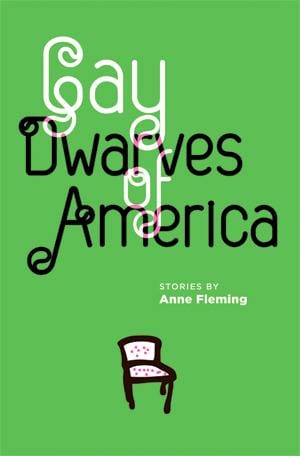Thirty-one one-word stories. The collected personal puke histories of an entire family (cat included). A musical featuring eccentric stockroom workers.
These are some of the forms and topics Anne Fleming explores in her new collection of stories, Gay Dwarves of America. Toying with various degrees of experimentation, Fleming fashions a dynamic collage of the humours and anxieties of urban Canadian life.
“My ideal reading experience is one that pairs the absurd and comedy with stuff that’s emotionally wrenching,” Fleming says. “The kind of thing where you’re laughing one minute and sucking in your breath the next.”
This is just the kind of tension Fleming creates.
Her melancholy prose is perhaps best on display in the titular story, “Gay Dwarves of America.” Two university-aged roommates create a joke website for “Gay Dwarves of America” on the assumption that there could never be such an obscure interest group. But as a concerned mother opens her heart to the webmasters, the narrator undergoes simultaneous political and sexual awakenings, neither of which are ever fully consummated.
Indeed, queer references in the stories are flirtatious, sometimes simmering quietly and sometimes emerging more obviously. In “Unicycle Boys,” a straight teenaged girl learns what it’s like to feel transgressive on a double date to the formal with a pair of wild and charming lesbians, whereas in “The Pear,” an older woman fixates on a younger female love interest. The sheer nonchalance of the queer characters’ presence provides a point of departure into subtler varieties of angst and joy than those borne out from, say, coming out or experiences of homophobia.
“It mattered to me that the book have stories with queer characters who were comfortable with themselves but also who represented a variety,” Fleming says.
There is a broader queer sensibility to the collection, too, which more subtly exposes and examines the instabilities and inconsistencies of institutions like the nuclear family, marriage and privacy. Fleming takes a critical eye to the kind of damage these structures permit, while quietly praising the strategies her characters use to negotiate them.
Perhaps the most interesting theme that Fleming undertakes is the process of aging, particularly in comparison with adolescence. This parallelism emerges quietly in several of the stories, such as “Thorn-Blossoms,” in which, through various outfits, a mother creates exotic identities for herself to wear to her son’s hockey games. Throughout the story, which, Fleming explains, is partially inspired by her own mother’s struggle with Parkinson’s disease, the protagonist struggles to balance the increasing strain of her senile mother and newly rebellious daughter.
Gay Dwarves of America is strikingly modern and will speak to a variety of readers. However, while some have praised the title, Fleming reports that others have shied away from it, not due to expected questions of political correctness, but rather because they find it downright jarring.
“I think that the title is off-putting to some nervous straight people, who think, ‘What the heck? Do I want to be seen reading this book?’” Fleming laughs. “But I hope some people will pick it up precisely because of the title.”
Fleming will find a wide audience with this new book — and it’s definitely worth being seen reading it.


 Why you can trust Xtra
Why you can trust Xtra


